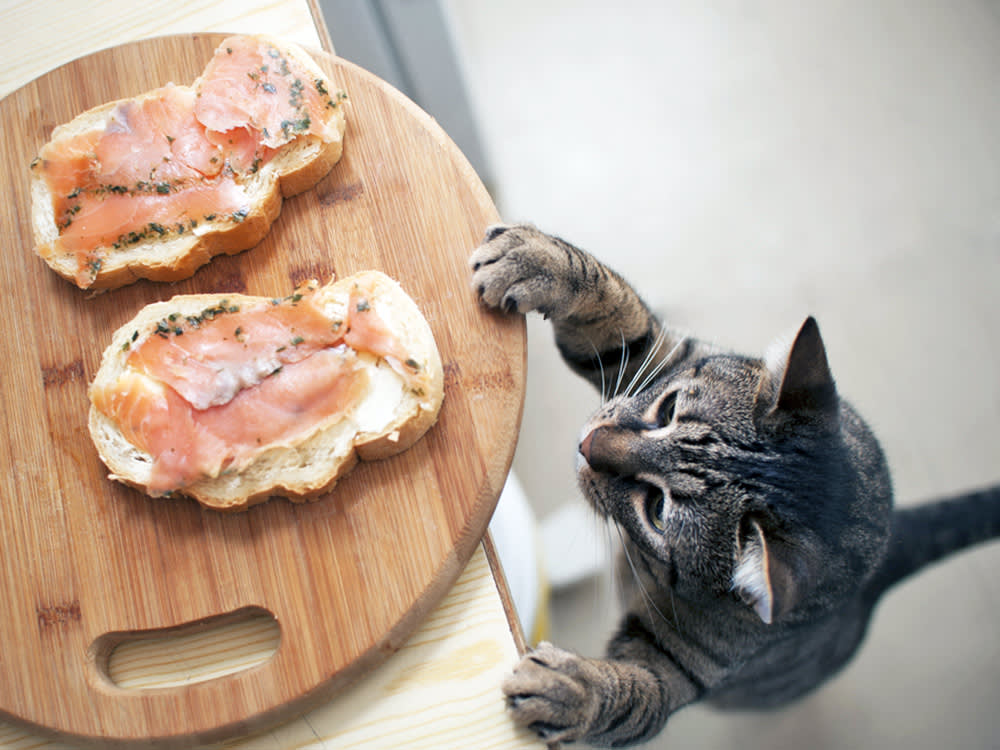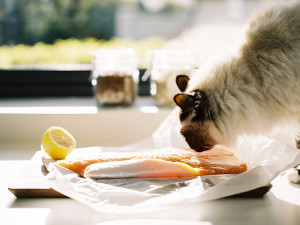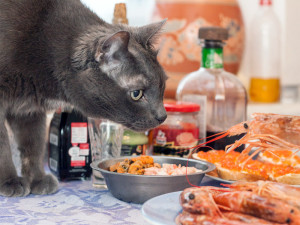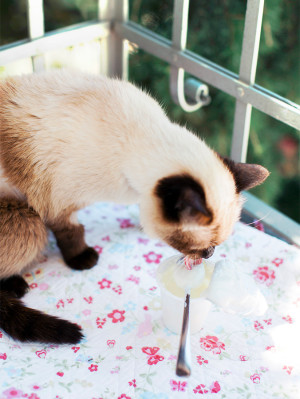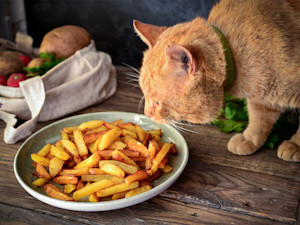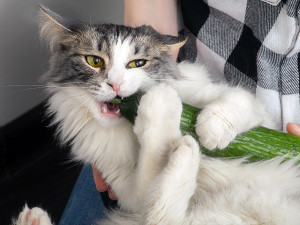Cats can eat cooked salmon as an occasional snack, and many cats will really love it. Cats and fish are a tale as old as time. Well, not exactly that old, but domestic cats have had a long love affair with fish of all kinds. In truth, the ancient ancestors of our house cats were desert-dwellers who probably never encountered fish and didn’t rely on it as part of their natural diet.
Over thousands of years of domestication, though, cats have discovered the endless benefits of being doted on by humans, including expanding their palates to include all kinds of fish. Salmon can provide many valuable nutrients to cats and are a common ingredient in many commercial cat foods. Read on to learn all about feeding salmon to cats.
Nutrition facts about salmon for cats
Salmon has been celebrated for its health benefits for humans for years, and many of these benefits also apply to cats. Salmon is a common name for a number of different fish species, including both Atlantic and Pacific varieties such as Chinook, Coho, Sockeye, and Atlantic Salmon.
These are cold-water fish that spend the bulk of their life in the ocean, but migrate to freshwater to lay eggs. Newly hatched salmon mature in these freshwater nurseries before heading back to the ocean. Nowadays, the bulk of salmon available in grocery stores is farmed because wild salmon are protected in many parts of the world. Salmon is rich in many critical nutrients including protein, fats, vitamins, minerals, and antioxidants that are very important for cats.
How much do you spend on your pet per year?
Is salmon good for cats?
Salmon is good for cats and is often a prime ingredient in commercial cat foods. When it is part of a complete and balanced diet, it can be very healthy for them. Some of the major benefits of salmon include:
Protein: As obligate carnivores, cats need animal-derived protein in their diets. Protein serves as an energy source for cats and also provides critical amino acids, which act as building blocks for new proteins in the body.
Fat: Salmon is rich in omega-3 fatty acids(EPA and DHA). These fats are also an important source of energy for cats. They support healthy skin, shiny coats, and act as potent anti-inflammatories in the body.
Vitamins and minerals: Salmon contains vitamin B6, vitamin B12, selenium, niacin, and thiamine along with many other important vitamins and minerals. These nutrients play many vital roles in the body including repairing DNA and supporting healthy growth. They are also required to aid in proper heart, brain, and nerve function.
Antioxidants: Salmon contains a unique antioxidant called astaxanthin. This is a carotenoid that comes from certain marine sources and protects cells from oxidative damage. It may help to decrease inflammation, slow the aging process, and reduce the risk of certain cancers.
Can cats eat any kind of salmon?
Cooked, plain, salmon of any kind is safe for cats in moderation. It is important to always keep in mind that cats have unique nutritional needs and the bulk of their diet needs to come from a complete and balanced cat food diet. If they are eating large amounts of fish or other table foods, they may not eat enough of their balanced diet, and this can put them at risk for serious nutritional deficiencies. As a general rule, the majority of their diet, about 90 percent, should be a complete and balanced cat food diet with the remaining 10 percent set aside for treats or table foods.
Is salmon completely safe for cats?
Cooked salmon is quite safe for cats. There are a few important points to consider if you want to share your salmon with your cat:
Other ingredients: Be sure that the salmon you share with your cat is plain, cooked salmon such as a steamed or baked portion of fish that does not have any seasonings or oils on it. While salmon itself is very safe for cats, some of the other ingredients it may be cooked with could be dangerous for cats. This includes toxic ingredients, like onions, garlic, or chives, as well as potentially unhealthy ingredients like high-fat dairy products including cream or butter.
Introduce other flavors: If you are feeding your cat a salmon-based cat food, this is a healthy way for them to get the benefits of salmon while also maintaining the balance of nutrients they need. At the same time, it is important to mix up their diet with other flavors of cat food from time to time, especially if you have a kitten. Fish-flavored cat foods are often so tasty to cats that if they become accustomed to only eating those flavors, it can be very difficult to introduce other flavors later in life. Sometimes cats will need a diet change later in life due to health issues like diabetes, urinary issues, or kidney disease. If they are used to eating an assortment of flavors and textures, these transitions are usually much easier.
Avoid skin and bones: If you are sharing pieces of whole fish, always remove the skin and bones before offering some to your cat. These parts of the fish can be choking hazards and sharp bones can cause injury and irritation to the mouth or digestive tract.
Cooked fish only: Cooked salmon is safe for cats but raw fish should not be shared. Raw fish carry a risk of pathogens including Salmonella and Listeria, which can cause illness in cats as well as be transmitted to other pets and humans in the home. Raw fish also contain an enzyme called thiaminase, which breaks down the vitamin, thiamine, a critical nutrient for cats. Cats who consume large amounts of raw fish regularly can develop a thiamine deficiency as a result. Cooking deactivates this enzyme, making it harmless, so cooked fish is always the safest option for your cat.
The bottom line: Can cats eat human food?
There are many human foods that cats can eat and that can provide important health benefits in return. Any cat parent will tell you that cats are very different from humans, and this is especially true when it comes to nutrition.
Cats are obligate carnivores, which means they require an animal-based diet to meet their needs. They have a higher demand for fats and proteins and do not metabolize carbohydrates as well as omnivores. This means that while they can enjoy many of the same foods as their human roommates on occasion, they really need to eat a complete and balanced cat-food diet primarily. The occasional treat or table scrap can be incorporated into their diet as long as the foods you choose to share are safe and nontoxic to cats, and that they are no more than 10 percent of your cat’s overall diet.
These guidelines will also help you to be mindful of your cat’s overall caloric intake to prevent accidental overfeeding. Indoor cats are at risk for gaining weight if they are sedentary for much of the day and also have access to more food than they really need. By balancing a healthy diet with increased play and mental enrichment, you can help your kitty to be as healthy and happy as possible.
Other foods that are safe for cats
Plain, cooked shrimp can be a safe treat for cats.
Berries, like strawberries, are also OK in small amounts.
Peanut butter is also safe in small amounts, just watch out for added ingredients.
Other foods that are dangerous
Citrus foods like oranges are usually repulsive to cats and the oils in their skin can be dangerous, too.
Chocolate is toxic to cats and should never be shared.
High-fat dairy products, like butter, are not healthy for cats and should be avoided.
FAQs (People also ask):
How much salmon can a cat eat?
Cats can eat small portions of cooked salmon as long as it is less than 10 percent of their total diet.
Is it OK to give cats salmon?
It is OK to give cats plain, cooked salmon as long as it does not contain skin or bones.
Why do cats like salmon?
Cats tend to love foods that are rich in fat and protein, like salmon, and they may be very intrigued by the smell too.
Can cats eat raw salmon?
No, cats should not eat raw salmon due to the risk of pathogens like Salmonella.
Can cats eat smoked salmon?
Smoked salmon is very high in salt and some forms are not heated to a high enough temperature to destroy bacteria that can make cats sick. It should not be shared with cats.
